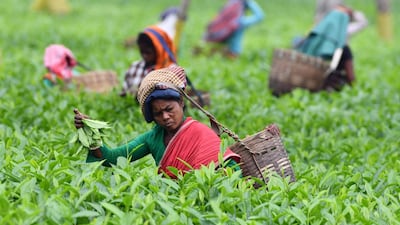One of the most memorable lines from sci-fi comedy The Hitchhiker's Guide to the Galaxy is the introduction to its tea-drinking, central protagonist Arthur Dent. The original radio script of Douglas Adams says of Dent: "He no more knows his destiny than a tea leaf knows the history of the East India Company."
Tea was a recurring theme in Adams' work, not least of all because it provided a point of contrast. What could be more far removed from stories of space travel, robots and artificial intelligence than the humble tea leaves?
It seems tea may not be that far removed from technology these days at all. The destiny of a tea leaf may soon be tracked in some detail, allowing tea drinkers anywhere in the world to see exactly where the leaves came from.
Last week, the 180-year-old tea producer Assam Company in India unveiled plans to introduce AI, Big Data and blockchain to help increase tea plantation output by nearly five times to reach a target of 50 million kilograms of tea within the next five years.
Asia has become a massive consumer of agritech and Asian agricultural producers will spend billions of dollars on AI over the next few years. So, it should come as no surprise that India has already developed a variety of emerging technologies to increase agricultural production.
For example, India's government policy unit Niti Aayog (which has been tasked with developing the national AI strategy) recently partnered with IBM to employ the technology to develop crop yield models. IBM India will soon also launch pilot studies in three Indian states to help support local farmers make decisions with improved data on weather, water and soil to boost productivity.
In the context of how emerging technologies are transforming modern industries, it makes perfect sense that the agricultural sector should use this new technology to collect and analyse farm data better, forecast weather more accurately and identify efficiencies to increase production.
What is interesting about the Assam Company's tech plans is how they will affect not only production at the tea plantation and efficiency in the supply chain, but the actual consumer experience of buying and drinking tea.
The oldest tea farming company in the world, Assam Company was originally incorporated in the UK by the Royal Charter of the British Empire in 1839, within weeks of the first shipment of tea leaves from India's Assam region being auctioned in London.
Last year, the company was bought by Abu Dhabi businessman BR Shetty, via BRS Investment, after an extended period of financial uncertainty for the tea grower. The Assam Company has 14 plantations across the Indian state of Assam and produces 11 million kilograms of tea, all picked by hand in the traditional method.
Post-acquisition, Mr Shetty is leading an ambitious strategy to transform the historic tea producer into a 21st-century digital enterprise, which will also improve the lives of its 26,000 farmers. Assam Company held a seven-day technology workshop earlier this month at its flagship Maijan Tea Estate, together with US agritech company SmartFarms to help create solutions for the tea business using Big Data, blockchain and AI.
Among its goals is to use AI to increasingly use farm data and smart drones to more accurately spray plants with pesticides and fertilisers, Assam Company also aims to develop a sophisticated blockchain system that tracks tea crops throughout the supply chain.
The global food industry is becoming a big user of blockchain technology. Food supply chains can be highly complex, to the extent that the origin of food ingredients can be difficult or even impossible to trace. A certain percentage of loss has always been built into food supply chains due to product deterioration, disease or simply poor management. For this reason, Nestle, Unilever, Walmart and others are developing blockchain solutions.
Assam Company and SmartFarms are developing a blockchain system that will trace the destiny of a tea leaf from the worker that picked it off the tree, right through to the consumer purchasing it anywhere in the world. The system will provide immutable proof of identification, authenticity and quality assurance.
The upshot of all this is that a tea drinker in Dubai, London or New York will soon be able to use a mobile app to trace where the leaves for their cup of tea came from, changing the nature of the drinking experience forever.
The tea drinker will be able to not only verify the region and farm from which the leaves orginated, but even see which farmer has plucked the leaves. The new system will also allow you to do something that has been so far completely impossible to do via traditional supply chain models: thank the person that picked your tea leaves.
Assam Company plans to make it possible for a tea drinker, anywhere in the world, to also be able to reward the farm worker. I'm sure that Adams would have approved.
Carrington Malin is an entrepreneur, marketer and writer who focuses on emerging technologies
